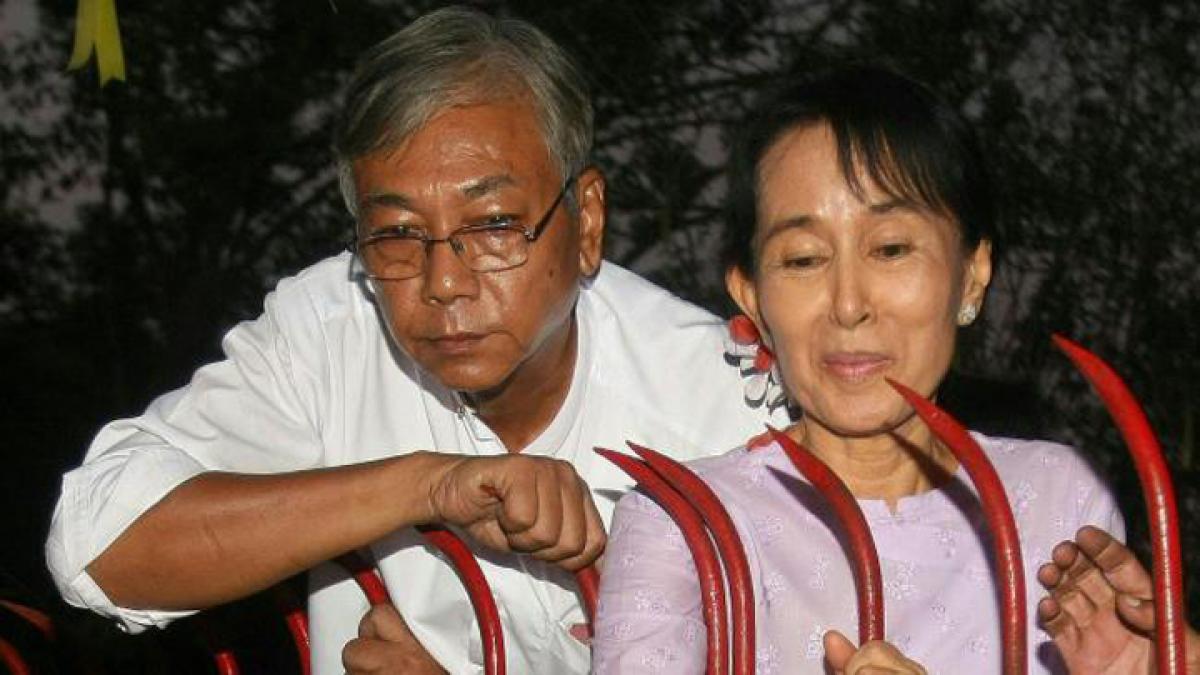Live
- Grand finale of Innovation marathon begins at IIT Tirupati
- Ensure no inconvenience to bus passengers: MLA
- Being overweight surpasses smoking as Australia's leading health risk
- Rush of Devotees at Tirumala normal, to take six hours for darshans
- Thiruvannamalai turns a major revenue earner for RTC
- Development works in Warangal to take off on war-footing: Ponguleti
- Great day for America: Trump welcomes FBI chief's resignation announcement
- SAAP chief for bringing hi-tech into sports
- Paddy purchases to be sped up
- Indian share market opens marginally up ahead of CPI data
Just In

Until two months ago, Htin Kyaw was not even a member of Aung San Suu Kyi\'s National League for Democracy (NLD). On Tuesday, Htin Kyaw, a longtime ally of Nobel Peace Prize laureate Aung San Suu Kyi, was elected Myanmar’s first democratically elected President since the 1960s.
Yangon : Until two months ago, Htin Kyaw was not even a member of Aung San Suu Kyi's National League for Democracy (NLD). On Tuesday, Htin Kyaw, a longtime ally of Nobel Peace Prize laureate Aung San Suu Kyi, was elected Myanmar’s first democratically elected President since the 1960s.
Htin Kyaw has risen to prominence for one reason: he is among Nobel peace prize laureate Suu Kyi closest friends, and she trusts him to run the country as her proxy. Suu Kyi cannot become the president of Myanmar, even though she is a towering political figure in the country after leading the democracy movement for 25 years through repressive military rule to a landslide general election win in November.
The constitution inherited from the junta bans her from the top office because her children are British citizens, as was her late husband. She has said she will run the country anyway, but to do that she needs somebody who she can trust to exercise presidential power for her. On March 10, the NLD nominated Htin Kyaw as its presidential candidate for the lower house of parliament, a move that propelled him into the position thanks to the party's overwhelming parliamentary majority.
Htin Kyaw ran the Daw Khin Kyi Foundation, established by Suu Kyi in 2012 and named after her mother, for the past few years. The charity works to raise health, education and living standards in the country's least developed areas. He was born in Yangon a year after Suu Kyi and attended the same high school as the NLD leader. He holds a postgraduate degree in economics from Yangon University and worked in the ministry of finance.
His father was a renowned poet and scholar who worked as an academic in Yangon and in Japan, and was a candidate for the NLD in its 1990 election win that the military government never recognised. Suu Kyi was placed under house arrest before that election.
After her release in 1995, Htin Kyaw became involved in her political activities through his father-in-law, U Lwin, who was then the NLD's secretary. U Lwin was one of the NLD's founding members and had previously served as deputy prime minister and finance minister under dictator Ne Win's socialist government. Su Su Lwin, his daughter, is married to Htin Kyaw and is a lawmaker with the NLD in the lower house. She, too, is close to Suu Kyi and runs parliament's international relations committee.
Under Myanmar's indirect system for electing a president, three candidates are nominated - one by the lower house, one by the upper house, and one by the military bloc in parliament. The constitution gives the armed forces a quarter of seats in both houses.
Because the NLD has a comfortable majority in both chambers it effectively controls two of those nominations. After being vetted by a parliamentary commission, the three nominees will be put to a vote by a special joint session of both houses, with the winner elected president and the two losing candidates becoming vice presidents.
The NLD nominated Henry Van Thio, a little known lawmaker from Chin state, in the country's northwest bordering India and Bangladesh, as its upper house candidate. The party had been expected to use its second nomination to ensure a representative of one of the country's myriad ethnic minorities becomes a high-level government member.
By Aung Hla Tun

© 2024 Hyderabad Media House Limited/The Hans India. All rights reserved. Powered by hocalwire.com







